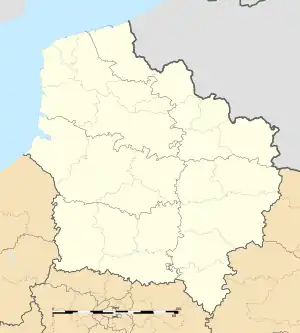Grand-Rullecourt | |
|---|---|
 Chateau of Grand-Rullecourt | |
 Coat of arms | |
Location of Grand-Rullecourt | |
 Grand-Rullecourt  Grand-Rullecourt | |
| Coordinates: 50°15′19″N 2°28′30″E / 50.2553°N 2.475°E | |
| Country | France |
| Region | Hauts-de-France |
| Department | Pas-de-Calais |
| Arrondissement | Arras |
| Canton | Avesnes-le-Comte |
| Intercommunality | CC Campagnes de l'Artois |
| Government | |
| • Mayor (2020–2026) | Stéphane Locquet[1] |
| Area 1 | 10.71 km2 (4.14 sq mi) |
| Population | 380 |
| • Density | 35/km2 (92/sq mi) |
| Time zone | UTC+01:00 (CET) |
| • Summer (DST) | UTC+02:00 (CEST) |
| INSEE/Postal code | 62385 /62810 |
| Elevation | 129–172 m (423–564 ft) (avg. 140 m or 460 ft) |
| 1 French Land Register data, which excludes lakes, ponds, glaciers > 1 km2 (0.386 sq mi or 247 acres) and river estuaries. | |
Grand-Rullecourt (French pronunciation: [ɡʁɑ̃ ʁylkuʁ]; Picard: Grand-Roucourt) is a commune in the Pas-de-Calais department in the Hauts-de-France region of France.[3]
Geography
Grand-Rullecourt is a farming village situated 15 miles (24 km) southwest of Arras, at the junction of the D74 and D79 roads.
Population
| Year | Pop. | ±% p.a. |
|---|---|---|
| 1968 | 350 | — |
| 1975 | 376 | +1.03% |
| 1982 | 354 | −0.86% |
| 1990 | 351 | −0.11% |
| 1999 | 334 | −0.55% |
| 2007 | 374 | +1.42% |
| 2012 | 402 | +1.45% |
| 2017 | 410 | +0.39% |
| Source: INSEE[4] | ||
Places of interest
- The chateau, built in 1746 by Antoine-Constant de Hamel, next to the previous castle, to plans by Jean-Joseph de Watelet, mayor of the city of Arras. After the French Revolution, the chateau was sold as a national asset, (Antoine's son having died on the scaffold). His grandson bought it back but couldn't afford to keep it. It later belonged to Captain Wallerand de Hauteclocque, who was killed during World War I. After the war, the property was sold in parts. The present owners, Vicomte Patrice de Saulieu O'Toole and his wife Chantal, are currently restoring the main building.
- The church of St.Leger, dating from the seventeenth century.
- A network of tunnels, particularly under the church.
 The front of the chateau
The front of the chateau The rear facade
The rear facade
See also
References
- ↑ "Répertoire national des élus: les maires". data.gouv.fr, Plateforme ouverte des données publiques françaises (in French). 9 August 2021.
- ↑ "Populations légales 2021". The National Institute of Statistics and Economic Studies. 28 December 2023.
- ↑ INSEE commune file
- ↑ Population en historique depuis 1968, INSEE
External links
Wikimedia Commons has media related to Grand-Rullecourt.
This article is issued from Wikipedia. The text is licensed under Creative Commons - Attribution - Sharealike. Additional terms may apply for the media files.